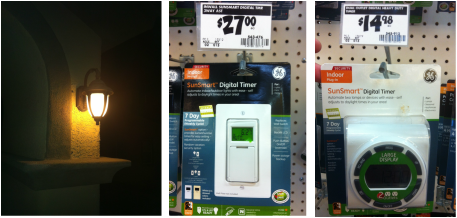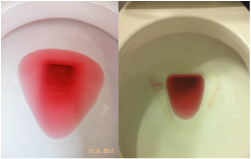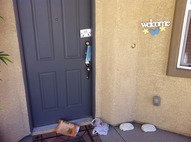Are you ready for departure?
We provide our clients with a complete departure checklist. This list is very helpful to make sure everything is set for a long term absence. During our first visit, we verify all items and if you forgot anything, don't worry, we will take care of it for you.
Index:1) Irrigation, watering tips and restrictions.
2) Secure your home! 3) Toilet leaks, how to find out? 4) Storing your car for an extended period? 5) Coach lights and occupancy lighting. 6) Furnace and A/C air filters maintenance. |
Index:7) Not home for a while? Water evaporation experiment.
8) Not home for a while? Be proactive. 9) Protect your identity. 10) How to clean/shutdown your bottled water dispenser. 11) Do you know your water valves? 12) Gas water heater operation, shutdown and start-up. 13) Water Softener Shutdown and Start-up. |
1) Irrigation. Watering tips and restrictions.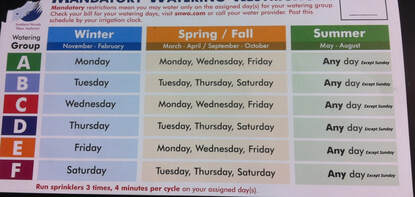 Southern Nevada Watering Restrictions
While you are absent, Home Watcher LV will adjust the irrigation timer schedule to comply with the watering restrictions in effect. Drip systems. Watering tips from the Southern Nevada Water Authority. Here. |
2) Secure your home.
It is critical that all windows, doors and gates are locked. First floor windows and doors should have two devices to keep them closed. Since many single lock devices can be defeated easily , a wooden stick or metal bar across the window or door should be set for additional protection. Yard gates and exterior breaker electrical panels should be locked as well. If a landscaping or pool service need access to the yard, give them a key or use a coded lock. If your front or rear door dead bolt and doors are not reinforced, consider installing a long striker plate as shown in our Home Maintenance Tips. |
3) Toilet leaks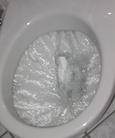 Leaky toilets?
Is the toilet leaking in your unoccupied vacation home? A leaky toilet can waste 22,000 gallons per year! An old flap is the cause of most water leaks. Once a year, you should inspect the flap of each toilet. If the flap is more than 5 years old, not flat or looks deformed, it's time to replace it. Its inexpensive and easy to do.
|
4) Storing your car for a while?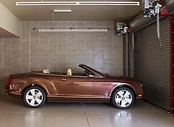 Stored vehicle.
|
9) Protect your identity... (when you are away) Important documents
|
10) How to clean and shutdown your bottled water dispenser...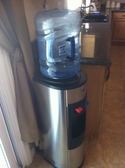 Don't forget the water cooler
Things you'll need;
The recommended procedure is HERE! |
11) Do you know your water valves?

Primary and secondary water valves.
We often get the comment from homeowners: "All my piping is copper and it will last a lifetime". Think again, what about the plastic connections to your faucets, refrigerator, toilets, water filter, etc. Will they last a lifetime? Will your rubber toilet flaps or water heater last a lifetime? We all know the answer. There is a significant risk if the water pressure is left ON. A disaster will happen, we just do not know when. This is a preventable situation.
Which valve should be shut off during an emergency or when you leave?
In the city, your water supply can be shut off from a valve near the street, but inside your home, the valve shown on the left above is your main water valve. This is possibly the best location to turn your water off, however be careful, this valve may also shut off the water supply to your irrigation system. To find out, start your irrigation system in manual mode and verify that your plants or lawn are being watered, then turn the main water valve off. If the irrigation system continues to dispense water, good news, you can shut down the water at the main valve. If the water flow stops, you will have to use an alternative.
In many homes of Southern Nevada, you will find a water line loop coming out of a wall, probably in the garage (above center). This loop is normally used to connect a water filter or a water softener. If you already have a water softener, then you may already have a shut off valve near the water softener.
If no valve or water softener is installed, a simple ball valve can be installed to the loop as shown above. This valve is the second best location to shut off the water to your home when you are away. When closed, only cold water may be available to your irrigation system, possibly exterior spigots and kitchen faucet. Be aware of all devices connected to the cold side of your kitchen faucet. This may include refrigerators,ice makers, water filters, etc.. This is a small investment that can help you sleep better at night.
12) Water heater operation, shutdown and start-up.
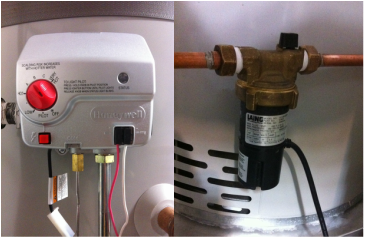
Gas water heater controls and warm water recirculation pump.
When you leave your home for an extended period of time, water pressure and temperature should be reduced to a minimum at your water heater. First, mark the normal operating set point at your water heater controls. (It should be about 120-130F). This is your reminder to know where to set it when you come back. Then, lower the temperature setting to "Vacation" or "Pilot". You can also turn it completely OFF, but you will need to ignite the pilot when you start it up again. If your home is equipped with a warm water "recirculation" pump similar to the unit shown in the picture, disconnect it from the wall outlet. Many of these pumps will run until warm water is distributed throughout the home. If no warm water is available, the pump will run continuously 24/7. Finally, turn the water pressure OFF (see article 12 about water valves). Bon voyage.
When you come back, open a hot water faucet in the kitchen, then open the main water valve slowly. Set the water temperature to your "marked" desired setting. As you do this, you should hear the burner light up. If not, check the pilot and follow the instructions on the heater to light it up. Reconnect and adjust the clock on your "recirculation" pump (if equipped). Let the hot water faucet run for a minute or two, then turn it off. Welcome home.
When you come back, open a hot water faucet in the kitchen, then open the main water valve slowly. Set the water temperature to your "marked" desired setting. As you do this, you should hear the burner light up. If not, check the pilot and follow the instructions on the heater to light it up. Reconnect and adjust the clock on your "recirculation" pump (if equipped). Let the hot water faucet run for a minute or two, then turn it off. Welcome home.
13) Water softener shutdown and start-up.
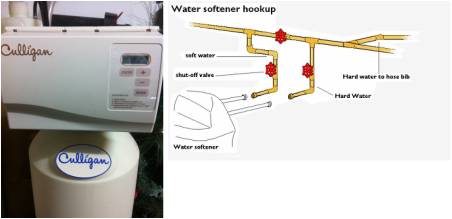
Water softener and typical supply, bypass and return valves arrangement
Water softeners come in multiple shapes and models, some have electronic timers with water flow meters while other older units are designed with a mechanical clock. During your absence, most newer models with an electronic control head and water flow sensor can be left connected and not in bypass mode. The picture on the left shows a valve set-up commonly used for a water softener. Basically, reverse the current position of the three valves to bypass the softener if desired.
Verify your user manual for shutdown instructions. If you remove power, you will most probably have to set the correct time when you reconnect the unit. Verify that you have at least 6 inches of water at the bottom of the empty salt tank and clean the tank as necessary. It is best that you initiate a manual regeneration cycle to properly flush the unit a day or two before you leave and do it again when you return to your property.
Verify your user manual for shutdown instructions. If you remove power, you will most probably have to set the correct time when you reconnect the unit. Verify that you have at least 6 inches of water at the bottom of the empty salt tank and clean the tank as necessary. It is best that you initiate a manual regeneration cycle to properly flush the unit a day or two before you leave and do it again when you return to your property.
Call Home Watcher LV at (702) 767-4175 or Contact us here.
Home Watcher LV assumes no responsibility for the content herein. The content is intended to provide general guidance. It is the responsibility of the reader to follow the manufacturers' instructions and verify compliance with any laws, codes and regulations.
For any concerns, please consult the manufacturer or a licensed professional.
For any concerns, please consult the manufacturer or a licensed professional.
